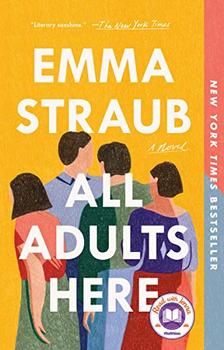Summary | Excerpt | Reading Guide | Reviews | Beyond the book | Read-Alikes | Genres & Themes | Author Bio

In an author's note at the end of All Adults Here, Emma Straub comments on her decision a few years ago—while she was in the process of writing this novel—to open the bookstore Books Are Magic in Brooklyn. Straub notes that her new family business involves "boxes and orders and systems and eccentricities," not to mention an ambitious series of literary events and a staff of more than a dozen employees. Her transition to full-time bookstore owner makes the fact that she successfully finished any novel pretty remarkable, let alone a novel as big-hearted, funny and occasionally joyful as All Adults Here.
Her description of the complexity and chaos behind running a bookstore does, however, feel of a piece with the subject of her book: the messy, imperfect nature of an extended family. At the heart of the family (and of the book) is its matriarch, Astrid Strick, who in the years since the death of her husband—and unbeknownst to any of her three adult children—has started a romance with a woman.
Astrid is head over heels in love with her hairdresser, Birdie, but isn't sure how to tell her children; witnessing the sudden death of her lifelong frenemy, Barbara, however, seems to galvanize her into breaking the news. But just as things in Astrid's personal life may be falling into place and she's happier than she's ever been, the rest of her family appears to be struggling.
Her granddaughter, Cecelia, is being sent to live with Astrid to attend middle school, after she was at the center of a scandal at her school in New York City. Astrid's two oldest children still live in the Hudson Valley town of Clapham where she also lives, but Porter (who operates a small but thriving cheese business) and Elliot (who seems driven to become some kind of construction magnate) barely speak to one another. And now it turns out that Porter—pushing forty, unmarried and having an affair with her high school sweetheart, who is currently married with children—is pursuing single motherhood by choice. Where did Astrid—and by extension, the entire Strick family—go wrong? As Astrid thinks to herself at one point, "That was the problem with being part of a family: Everyone could mean well and it could still be a disaster."
The mood of Straub's novel is by turns serious and sunny, and the experience of reading it is so effortless and enjoyable that readers might not even notice just how skillfully the author juggles a handful of narrative points of view, not to mention numerous conflicts, issues and themes. Bullying, sexuality, jealousy, gender identity, evolving friendship, infidelity, greed, waning fame, approaching middle age and accepting mortality—these are ambitious themes for any novel, and it's especially impressive that Straub manages to address them all without making the story feel ponderous or overstuffed. In fact, the inclusion of the characters' personal discoveries and crises helps enrich the fictional landscape she creates, and they make the Strick family—as well as their friends, neighbors and acquaintances—feel convincingly real.
The gender identity journey of a new friend of Cecelia's feels especially poignant and joyful, as does Porter's gradual acceptance of a different kind of happy ending. But Astrid, naturally, in her role as the shifting but still rock-solid anchor to her children's lives, remains the emotional heart of the novel. Like her children themselves, perhaps, she struggles at times to remember that they are (as the title suggests) all adults now, and that her role as a mother is not what it once was. Near the end of the novel, Astrid thinks about "how every decision of hers had rippled into her children's lives, even...when she was still their mother every day but not actually in charge of their lives, not making decisions on their behalf." All Adults Here celebrates the connections between family members and within communities, acknowledging interdependence while also recognizing that relationships—and the individuals within them—will not cease changing.
![]() This review was originally published in The BookBrowse Review in June 2020, and has been updated for the
May 2021 edition.
Click here to go to this issue.
This review was originally published in The BookBrowse Review in June 2020, and has been updated for the
May 2021 edition.
Click here to go to this issue.

If you liked All Adults Here, try these:

by Ann Patchett
Published 2025
In this beautiful and moving novel about family, love, and growing up, Ann Patchett once again proves herself one of America's finest writers.

by Ann Napolitano
Published 2024
From the New York Times bestselling author of Dear Edward comes a poignant and engrossing family story that asks: Can love make a broken person whole?
To limit the press is to insult a nation; to prohibit reading of certain books is to declare the inhabitants to be ...
Click Here to find out who said this, as well as discovering other famous literary quotes!
Your guide toexceptional books
BookBrowse seeks out and recommends the best in contemporary fiction and nonfiction—books that not only engage and entertain but also deepen our understanding of ourselves and the world around us.